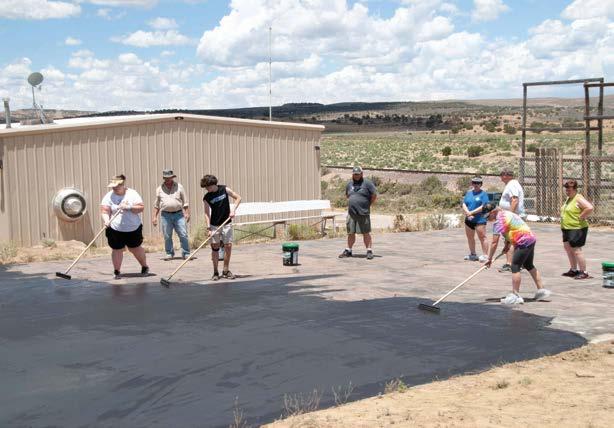
6 minute read
Reimagining Local Church Ministry
by Pastor David Odegard, CGGC President
Jesus Christ rose from the dead, appeared to His disciples, and sent them to the corners of world bearing the message that the Kingdom of God has arrived. The Kingdom advances from its epicenter in Jerusalem, rippling through space and time, leaping from heart to heart ever in conflict “against the powers of this dark world and against the spiritual forces of evil in the heavenly realms” (Ephesians 6:12). Nevertheless, these evil forces could not entirely resist the “demonstration of the Spirit’s power” (1 Corinthians 2:4) and the dedicated evangelism of true Jesus followers as they traversed the globe shining the light of Christ’s resurrection in every dark space they could reach.
Christianity triumphed over the powers of Roman darkness, brutality, and its culture of death. The churchmen of the age of Nazianzus, Augustine, and Patrick stubbornly refused to love what the pagans loved. Their hearts were captivated by the Father, the Son, and the Holy Spirit, and they fought to maintain their first love, ordo amoris. Because of this they provided a deep intellectual frame for loving God in a hostile world, a source of theological unity, and structure to keep the Kingdom advancing in the face of determined, Satanic obstruction. As Jesus prophesied, “I will build my church, and the gates of hell shall not prevail against it” (Matthew 16:18).
Jesus began to stitch the patchwork mosaic of the barbarian tribes of Europe together by His work through the Church, through the development of common stories, values, philosophy, and experience. A culture of life began to blossom under the dark shade of Roman tyranny, fostered by Christians’ faithful adherence to the Scriptures, and especially the new order of worship set down by the New Testament.
Their lives were centered upon and ordered by a new identity “in Christ.” They allowed God to order their homes and businesses by His Word. Wives, husbands, children, neighbors behaved differently as members of God’s new society, the Kingdom. They took seriously the Sermon on the Mount, and showed their devotion to the Apostles' teaching, prayer, the weekly fellowship gathering, and the Lord’s Table.
Christianity slowly overcame the surrounding barbarian cultures by becoming the very center of every community and sharing the blessings of the abundance of the Christian life to whatever degree it could. “. . . Stand at the crossroads and look; ask for the ancient paths, ask where the good way is, and walk in it, and you will find rest for your souls. . .” (Jeremiah 6:16).
We find ourselves in a similar situation today. On the one hand, postmodernism is preparing the way for a resurgence of barbarianism; on the other, philosophical naturalism has steadily risen as a shiny new, secular religion, purporting itself to be a fully robust worldview capable of providing meaning to the modern world; but it isn’t. Naturalism, secularism, and scientism fail to provide an adequate basis for goodness as the 20th century has repeatedly demonstrated. Without an objective point of reference centered in God Himself, one cannot develop and sustain a campaign for the Kingdom of God.
The 4 Essentials
Therefore, we must learn how to think and preach in a time of subjective relativism. How to love in an era where tolerance and compassion have been politicized to the point where it brings harm to its recipients. How to pray in the internet age, the postquarantine age. How to live faithfully present as life to the perishing: to be incarnate in our ever more discarnate world. I believe that if we put Acts 2:42 in a metaphorical Bunsen burner and turn up the heat, as it begins to boil it will release four essentials for mainstreet ministry or local ministry.
First, the Word and the Apostle’s Teaching. This is the weight of the Good News message to which all Christians are to bear witness, even to the ends of the world. It is the summary of Jesus’ person and work, the gospel, the kerygma, the Word. Only the Gospel can convey the saving truth of God’s promise of salvation and the means for us to grow as disciples.
Secondly, Prayer. Oswald Chambers said that “prayer is the great essential of fitness.” This means that without prayer, nothing comes to life. Prayer is the basic work of the Christian. A solid gospel strategy includes mobilizing churches to pray for everyone within reach in a sustainable, longterm way. At Wharton, we divided the town up in seven zones and prayed for everyone by name. It was very difficult, but it changed the church from an aging, introspective church to the center of the community. Where your investments are, there your heart will be also. You will love those in whom you invest prayer.
Thirdly, Love. We are called to radical hospitality and to love the world. God loved the world so much, He gave them His unique Son. Jesus said, “As the Father sent me, so I send you” (John 20:21). We are sent to demonstrate love to a world in revolt against its Creator. That is very difficult, but remains our calling. Be creative in how you demonstrate love for the people of your community. We did a variety of outreach events and we also let people know we were praying for them. Love is attractive and infectious; if you want young people in your church, you must love your community practically (and in truth).
Fourthly, Time. Life with God is formative over our entire lives. We are in a marathon, not a sprint. As we do the first three things faithfully throughout our lives, we must be patient. All things take time to grow and develop. Be faithful. As Chris Clugh, worship director at Grand Point Church, said once in a seminar, “We must demonstrate faithfulness. Be faithful faithful faithful faithful faithful faithful faithful faithful faithful, and then one day—boom—fruit.”
Word (preaching, teaching, communication), Prayer, Love, Time. These are a handful of essentials for local church ministry.







